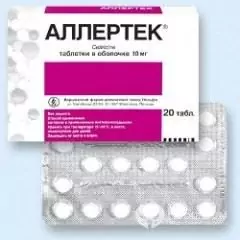- Author Rachel Wainwright wainwright@abchealthonline.com.
- Public 2023-12-15 07:39.
- Last modified 2025-11-02 20:14.
Allertek
Instructions for use:
- 1. Release form and composition
- 2. Indications for use
- 3. Contraindications
- 4. Method of application and dosage
- 5. Side effects
- 6. Special instructions
- 7. Drug interactions
- 8. Analogs
- 9. Terms and conditions of storage
- 10. Terms of dispensing from pharmacies

Allertek is a drug with antipruritic, antihistamine, antiallergic action.
Release form and composition
Allertek is produced in the form of coated tablets: from cream to white, oblong, with a dividing one-sided line (7, 10 or 20 pcs. Blisters, 1 blister in a cardboard box).
Composition of 1 tablet:
- Active substance: cetirizine dihydrochloride - 10 mg;
- Auxiliary components: lactose, microcrystalline cellulose, corn starch, polyvinylpyrrolidone 25, magnesium stearate, sodium starch gluconate, silica gel, sodium lauryl sulfate;
- Sheath: polyethylene glycol 6000, hydroxypropyl methylcellulose.
Indications for use
- Year-round / seasonal allergic rhinitis;
- Quincke's edema;
- Hay fever;
- Allergic conjunctivitis;
- Itchy allergic dermatoses (including neurodermatitis, atopic dermatitis);
- Urticaria (including chronic idiopathic)
Contraindications
- Pregnancy and lactation;
- Age up to 6 years;
- Hypersensitivity to drug components.
Relative (Allertek is prescribed with caution in the presence of the following diseases / conditions):
- Chronic renal failure of moderate and severe degree (it is necessary to adjust the dosage regimen);
- Advanced age (due to a possible decrease in glomerular filtration).
Method of administration and dosage
Allertek is taken orally, regardless of the meal, preferably in the evening. The tablets should be swallowed without chewing, whole, washed down with water in a small amount.
Recommended dosage regimen:
- Children 12 years of age and older: 10 mg daily;
- Children 6-12 years old: 10 mg daily in 1 or 2 divided doses (morning and evening).
In patients with renal impairment, the dose should be reduced to 5 mg per day.
In case of functional disorders of the liver, especially in combination with renal failure, the dose is selected individually.
Elderly patients with normal renal function should not adjust the dose.
Side effects
In general, Allertek is well tolerated.
Possible side effects:
- Central nervous system: in some cases - agitation, drowsiness, headache, dizziness;
- Digestive system: dry mouth; in some cases, abdominal pain, dyspepsia, flatulence;
- Allergic reactions: in isolated cases - angioedema, urticaria, shortness of breath (in this case, you must immediately interrupt therapy).
special instructions
If any adverse reactions develop, you should consult a specialist.
Combined use of Allertek with other substances / drugs should be avoided without a doctor's prescription.
It is not recommended to use ethanol during therapy.
Allertek is prescribed with caution to patients performing potentially hazardous types of work that require quick psychomotor reactions and increased attention.
Drug interactions
With the combined use of Allertek with theophylline, the incidence of adverse reactions may increase.
Analogs
Allertek's analogs are: Alerza, Zyrtec, Zodak, Letizen, Parlazin, Cetirizin, Cetirizin Hexal, Cetirizin DS, Cetirinax, Cetrin, Cetirizin-Teva, Zetrinal, Zinset, Cetirizin-OBL.
Terms and conditions of storage
Store in a dark, dry place out of reach of children at a temperature of 15-25 ° C.
Shelf life is 4 years.
Terms of dispensing from pharmacies
Available without a prescription.
Information about the drug is generalized, provided for informational purposes only and does not replace the official instructions. Self-medication is hazardous to health!






